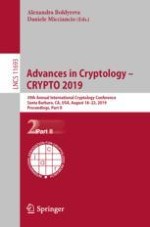2019 | OriginalPaper | Buchkapitel
Unifying Computational Entropies via Kullback–Leibler Divergence
verfasst von : Rohit Agrawal, Yi-Hsiu Chen, Thibaut Horel, Salil Vadhan
Erschienen in: Advances in Cryptology – CRYPTO 2019
Aktivieren Sie unsere intelligente Suche, um passende Fachinhalte oder Patente zu finden.
Wählen Sie Textabschnitte aus um mit Künstlicher Intelligenz passenden Patente zu finden. powered by
Markieren Sie Textabschnitte, um KI-gestützt weitere passende Inhalte zu finden. powered by

